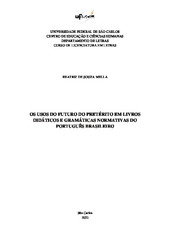Os usos do futuro do pretérito em livros didáticos e gramáticas normativas do português brasileiro
Resumen
The future of the past tense in Brazilian Portuguese is defined as a verb tense that expresses a future occurrence in relation to an event that took place in a past moment (FARACO; MOURA, 2000). This prototypical definition, however, is not able to cover all the nuances of meaning that this mode-temporal morpheme can express. Besides the temporal value, the future of the past tense is used with modal values (of hypothesis, uncertainty, doubt, among others), since it is established in the field of the imaginary, and can also be a marker of evidentiality (LOURENÇO, 2016; MELLA, 2020). Thus, this theoretical-analytical work intends to verify how grammars and textbooks of Elementary II, adopted by the public school system, deal with the future tense, in order to analyze how the traditional method and its conceptions affect the teaching of Portuguese in Brazil. From this, it is intended to demonstrate the importance of the treatment of verbs considering all its facets of effective and real use, based on a theoretical support of social-functionalist character.
Colecciones
El ítem tiene asociados los siguientes ficheros de licencia:

